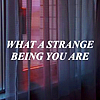You need to sign in or sign up before continuing.
Take a photo of a barcode or cover
challenging
dark
emotional
mysterious
reflective
tense
slow-paced
Plot or Character Driven:
A mix
Strong character development:
Complicated
Loveable characters:
Complicated
Diverse cast of characters:
No
Flaws of characters a main focus:
Complicated
Ambitious, philosophical, lyrical prose, difficult to define into a single genre, and, at times, frustrating.
challenging
dark
mysterious
tense
slow-paced
Plot or Character Driven:
A mix
Strong character development:
Complicated
Loveable characters:
No
Diverse cast of characters:
No
Flaws of characters a main focus:
Yes
Great start, ending kind of waned.
This bumps up against the ideas in Vita Nostra and shows like The OA with the grand jeu but those things offer you a more defined yet nebulous thing. The idea that if you could wrap your brain around it, if you could think outside the prescribed thought processes, then you absolutely could fathom this unfathomable thing. The grand jeu never tries to define what it is beyond a 'game' though, there's a collection of things, a random assortment of different ways of communicating, and that's it. There's no real description of it, of a point system - even a subjective one, of the purpose of it, of what success consists of, etc., and that's only ever going to almost be something.
I don't like that if I asked the authority on this, the author, what the game is.... I don't think there'd be an answer. Not a coherent one anyway.
I don't like that if I asked the authority on this, the author, what the game is.... I don't think there'd be an answer. Not a coherent one anyway.
Esta es una novela que tiene muchas similitudes en cuanto a ambientación y ritmo con 'El encuadernador', novela que levantó pasiones y bostezos a partes iguales. En mi caso, esta nueva novela de Bridget Collins me ha resultado algo más desequilibrada que aquella, en parte porque la primera mitad de la novela es extremadamente lenta. La segunda mitad, sin embargo, me animó a terminar su lectura.
El personaje principal vuelve a Montverre, donde se sitúa un exclusivo colegio donde sus alumnos aprenden el grand jeu, una especie de juego que surge de las matemáticas y la música y cuya lógica nunca termina por explicarse en el libro. Allí regresa Léo Martin, quien consiguió una medalla de oro en el pasado. A su llegada se encuentra un colegio muy cambiado. La nueva Magister Ludi, una gran maestra, le trae recuerdos de lo que alli pasó en el pasado. La novela se mueve entre el pasado y el presente para, en realidad, contarnos dos historias de amor que, sin embargo, se relacionan directamente y se ven alteradas por lo que sucedió en el pasado.
La primera mitad de la novela es muy similar a las miles de novelas de jóvenes en un colegio exclusivo cerrado. Amores, sospechas, exámenes, bullying, etc. Nada nuevo ni especial. Es a partir de la mitad cuando la traición que da título a la novela en castellano (en inglés se llama 'Las traiciones', en plural) se descubre y eso da lugar a contra-traiciones que te llevan hasta el final del libro.
La historia no tiene un componente fantástico, más allá de situarse en un mundo que no parece el nuestro. Sin embargo, no se conoce prácticamente nada de lo que sucede fuera de las paredes de Montverre. De hecho, lo poco que sabemos será a través de algunas cartas o de comentarios al respecto del pasado político conservador del protagonista de la historia.
Solo puedo recomendar esta novela si os gustó 'El encuadernador'. Y es que 'La traición de Montverre' cuenta con una ambientación similar y un ritmo incluso más pausado que aquella, por lo que no esperéis encontrar algo distinto.
El personaje principal vuelve a Montverre, donde se sitúa un exclusivo colegio donde sus alumnos aprenden el grand jeu, una especie de juego que surge de las matemáticas y la música y cuya lógica nunca termina por explicarse en el libro. Allí regresa Léo Martin, quien consiguió una medalla de oro en el pasado. A su llegada se encuentra un colegio muy cambiado. La nueva Magister Ludi, una gran maestra, le trae recuerdos de lo que alli pasó en el pasado. La novela se mueve entre el pasado y el presente para, en realidad, contarnos dos historias de amor que, sin embargo, se relacionan directamente y se ven alteradas por lo que sucedió en el pasado.
La primera mitad de la novela es muy similar a las miles de novelas de jóvenes en un colegio exclusivo cerrado. Amores, sospechas, exámenes, bullying, etc. Nada nuevo ni especial. Es a partir de la mitad cuando la traición que da título a la novela en castellano (en inglés se llama 'Las traiciones', en plural) se descubre y eso da lugar a contra-traiciones que te llevan hasta el final del libro.
La historia no tiene un componente fantástico, más allá de situarse en un mundo que no parece el nuestro. Sin embargo, no se conoce prácticamente nada de lo que sucede fuera de las paredes de Montverre. De hecho, lo poco que sabemos será a través de algunas cartas o de comentarios al respecto del pasado político conservador del protagonista de la historia.
Solo puedo recomendar esta novela si os gustó 'El encuadernador'. Y es que 'La traición de Montverre' cuenta con una ambientación similar y un ritmo incluso más pausado que aquella, por lo que no esperéis encontrar algo distinto.
I thoroughly enjoyed this book. I appreciated the complex characters and wow that plot twist! Didn’t see that coming. I also liked how everything tied in together. I gave it 4 stars because there were many parts, especially in the beginning, that were just so confusing mostly because I didn’t realize there was a past and present being written and that definitely could’ve been made more clear.
I found this book in the fantasy and science fiction part of my local library because I wanted to read more about fantastical, magical worlds. It spoke to me first by visual language of the gorgeous cover art. The blurb told me nothing and I'm so glad it didn't. I went into this dark, strange world blindly and came out... christened? Ironically to the book, that would be the closest word I can think of right now. Or maybe sanctified? No, that's too grandiose for what the experience actually was.
I was mystified, my heart was dragged through ashes and shards of glass, my intelligence humbled (yes, I am not sure I understood everything I read). And at the end, there's also something more tired but also (a bit more) pure and playful, and slightly more in love (with life as it is) in me than before reading this book.
I was looking for fantasy or science fiction, and instead I received a gift of great fiction.
However, I can also see how this book might not be for everyone, and even might not have been for me at a different moment in my life. And that's ok. Such is the game of storytelling and of living through stories.
If you're reading this review and thinking, omg I am even more confussed now, well, I am not sorry.
I was mystified, my heart was dragged through ashes and shards of glass, my intelligence humbled (yes, I am not sure I understood everything I read). And at the end, there's also something more tired but also (a bit more) pure and playful, and slightly more in love (with life as it is) in me than before reading this book.
I was looking for fantasy or science fiction, and instead I received a gift of great fiction.
However, I can also see how this book might not be for everyone, and even might not have been for me at a different moment in my life. And that's ok. Such is the game of storytelling and of living through stories.
If you're reading this review and thinking, omg I am even more confussed now, well, I am not sorry.
adventurous
dark
mysterious
reflective
medium-paced
Plot or Character Driven:
Character
Strong character development:
Yes
Loveable characters:
Yes
Diverse cast of characters:
No
Flaws of characters a main focus:
Yes
dark
slow-paced
Plot or Character Driven:
A mix
Strong character development:
Yes
Loveable characters:
No
Diverse cast of characters:
No
Flaws of characters a main focus:
Yes
adventurous
emotional
mysterious
slow-paced
Plot or Character Driven:
Character
Strong character development:
Yes
Loveable characters:
Complicated
I absolutely loved Bridget Collins's first book and I just couldn't wait for her next book to be released. That's why I preordered this as soon as it was available. Unfortunately, though I tried it twice, this books just couldn't spark my interest beyond the first 5-10 pages. Then on a whim, I downloaded the audiobook in a different language, and e voila. Magic happened. I was desperate to know how the story continued and was impatiently waiting for the story to progress. I enjoyed this book a lot and I actually wouldn't mind a novella in which the story continued for a little bit.
Nothing about this narrative sat right with me at all.
[EDIT] In the months since I posted this tiny review, I've been going back and forth on whether I should elaborate. Well! I've decided that I'm finally going to.
I began feeling strange about the way this book was written at about the time when Claire started mentioning her womanly womanly ways and how she bleeeeeds like a woman because she's a woman and women bleed. It initially felt like a very heavy-handed method of highlighting her otherness. Useful, perhaps, in smaller doses, but the way this was written felt like being constantly smacked over the head with a hammer with the venus symbol painted on it.
Also, Bridget Collins, are you okay? Is this really your lived experience of menstruation? I would consider going to a doctor if so. This poor character must be anaemic by now! This is the kind of description of menstruation I would expect from somebody who has never experienced it nor had the wherewithal to ask anyone who has experienced it (or even just googled it!).
The whole plot of the book, also, gave me pause. Spoilers ahead!
When the pieces started to be put together, the image the reader has for a while is that Claire is the sister of Carfax, Léo's schooltime love. The ever-constant comparisons between Claire and Carfax in these scenes felt extremely uncomfortable on a first read through. It seemed very... odd, to have a bisexual protagonist fall for a female character on the basis that they heavily resemble their male sibling. I don't necessarily think that a plot with that premise is inherently an issue, but the way it was handled in this narrative left a bad taste in my mouth. It felt questionable.
Of course, though, the twist in the tale is that Claire IS actually the Carfax that Léo fell in love with, having disguised herself as her bipolar brother to attend his elite school. Thank you, by the way, Bridget Collins, for the delightful handling of a mentally ill barely-a-character who commits suicide to further his sister's personal angst-fest. A charming decision, honestly. Really sensitive.
The decision to have Claire BE Carfax sat very strangely with me. The way it was handled felt very off. The trope of 'woman disguises herself as a man to attend something she wouldn't be able to as a woman' is as old as time, and in this scenario felt extremely trite and uninspired. Perhaps if there had been any nuance whatsoever in regards to how the narrative interacted with gender, instead of the heavy-handed mess that we got, this plot line could have worked better.
Imagine my surprise (ha) when, on the hunch I picked up from the phrasing in this book, I checked Bridget Collins' 'following' page on Twitter, to find it rife with TERFs (trans-exclusionary radical feminists). Of course, I am familiar with death of the author, and separating the art from the artist. Heaven knows, one learns enough about that reading classical literature. But can that be successful when the dogwhistles of gender essentialism and transgender exclusion have seeped through a work like a viscous, oily stain? I would argue not. Perhaps for some people it is possible to ignore the blatancy of this, but unfortunately for me it was the final damning nail in the coffin of a book that had already gone far beyond the limits of my taste.
It's a shame, as The Binding was a book with a fascinating premise, and the complexity of the plot in The Betrayals was still interesting to read, but there is unfortunately no way I will be considering reading any new Bridget Collins books in the future after this mess.
[EDIT] In the months since I posted this tiny review, I've been going back and forth on whether I should elaborate. Well! I've decided that I'm finally going to.
I began feeling strange about the way this book was written at about the time when Claire started mentioning her womanly womanly ways and how she bleeeeeds like a woman because she's a woman and women bleed. It initially felt like a very heavy-handed method of highlighting her otherness. Useful, perhaps, in smaller doses, but the way this was written felt like being constantly smacked over the head with a hammer with the venus symbol painted on it.
Also, Bridget Collins, are you okay? Is this really your lived experience of menstruation? I would consider going to a doctor if so. This poor character must be anaemic by now! This is the kind of description of menstruation I would expect from somebody who has never experienced it nor had the wherewithal to ask anyone who has experienced it (or even just googled it!).
The whole plot of the book, also, gave me pause. Spoilers ahead!
When the pieces started to be put together, the image the reader has for a while is that Claire is the sister of Carfax, Léo's schooltime love. The ever-constant comparisons between Claire and Carfax in these scenes felt extremely uncomfortable on a first read through. It seemed very... odd, to have a bisexual protagonist fall for a female character on the basis that they heavily resemble their male sibling. I don't necessarily think that a plot with that premise is inherently an issue, but the way it was handled in this narrative left a bad taste in my mouth. It felt questionable.
Of course, though, the twist in the tale is that Claire IS actually the Carfax that Léo fell in love with, having disguised herself as her bipolar brother to attend his elite school. Thank you, by the way, Bridget Collins, for the delightful handling of a mentally ill barely-a-character who commits suicide to further his sister's personal angst-fest. A charming decision, honestly. Really sensitive.
The decision to have Claire BE Carfax sat very strangely with me. The way it was handled felt very off. The trope of 'woman disguises herself as a man to attend something she wouldn't be able to as a woman' is as old as time, and in this scenario felt extremely trite and uninspired. Perhaps if there had been any nuance whatsoever in regards to how the narrative interacted with gender, instead of the heavy-handed mess that we got, this plot line could have worked better.
Imagine my surprise (ha) when, on the hunch I picked up from the phrasing in this book, I checked Bridget Collins' 'following' page on Twitter, to find it rife with TERFs (trans-exclusionary radical feminists). Of course, I am familiar with death of the author, and separating the art from the artist. Heaven knows, one learns enough about that reading classical literature. But can that be successful when the dogwhistles of gender essentialism and transgender exclusion have seeped through a work like a viscous, oily stain? I would argue not. Perhaps for some people it is possible to ignore the blatancy of this, but unfortunately for me it was the final damning nail in the coffin of a book that had already gone far beyond the limits of my taste.
It's a shame, as The Binding was a book with a fascinating premise, and the complexity of the plot in The Betrayals was still interesting to read, but there is unfortunately no way I will be considering reading any new Bridget Collins books in the future after this mess.






